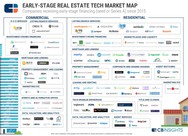
Marketing Best Practices
Top Picks: Most Popular CRE Tech Stories of 2017
2017 was another exciting year for the CRE tech ecosystem with the continued rise of technology adoption, shifts in the digital landscape and creation of new opportunities. Here’s a look back at the most popular stories that made headlines in the past year.
Did we miss anything? Please share in the comments.
Why the Retail Store is Not Dead
February 2017
The magnitude of disruption over the last decade is indisputable — as evidenced by ongoing rounds of store closures including several new rounds in 2017. Does the future of shopping belong to e-commerce? Actually, no. In fact, many retailers are heralding a new retail ecosystem.
Read the full article by Steven Barr on Forbes
How Data and Sustainability Will Shape Supermarkets of the Future
February 2017
From vertical farming to motion-sensitive displays, supermarkets across Europe are embracing new technology that caters to food-savvy, eco-aware consumers. “Providing a large amount of information easily and accessibly is a way to improve efficiency – for customers who are increasingly concerned about where their food comes from, and for retailers who want to meet this need,”
Read the full article by Natasha Stokes on JLL Real Views
Top Five Digital Transformation Trends in Retail
March 2017
Whether retail is ready for it or not, consumers have become hooked on the real-time, personalized world of the modern digital landscape, and they expect their retail providers to follow suit. Today’s digital consumer is a demanding beast. They want what they want, and they want it now. (And that’s just today’s shoppers; don’t even get me started on Generation Z, which is actually expected to become the next big retail disruptor.)
Read the full article by Daniel Newman on Forbes
The Power Disruptors: The Players Who are Upsetting Real Estate’s Status Quo
April 2017
In today’s economy, change is inevitable. New ideas and innovations constantly transform the way people do business. As the technology sector has grown—permeating nearly all aspects of the global economy – every entrepreneur is seeking the next big, disruptive product or platform. Traditional industries, especially, have appeared ripe for disruption by tech-focused companies.
Real estate has been no exception to this. The industry is perpetually evolving, with companies ranging from established internet giants to plucky tech startups bringing fresh approaches to the table.
Read the full article by Rey Mashayekhi on Commercial Observer
What New Technologies Mean for the Future of Office Space
May 2017
Changes in the workplace have come fast and furious over the past few years, with new technologies advancing digital mobility and giving rise to worker demands for a flexible work environment. Office users have responded by creating open, collaborative office environments with a variety of workspaces and amenities to attract and retain talent.
Read the full article by Patricia Kirk on NREI
Early-Stage Real Estate Tech: 120+ Companies Building the Industry’s Future
June 2017
Real estate is a massive asset class representing trillions of dollars in value. To date, the industry has not been thoroughly affected by technology and software, but investment from venture capital investors into technology startups operating in the space has picked up in the last year. Through 2017 year-to-date (6/6/17), investors have already invested $1.46B across 107 deals. At the current run-rate, total dollars invested are expected to exceed 2016 by 25% to $3.4B.
Read the full article on CB Insights
A New Venture Firm Focused on Real Estate has Raised $212 Million from Real Estate Industry Giants
July 2017
It isn’t easy to find white space in the world of venture capital, where every venture firm must have a specific vision to sell to the universities, pension funds and family offices that tend to fund them. But Brendan Wallace and business partner Brad Greiwe have a fresh pitch, as well as nontraditional investors. Their L.A.-based venture firm, Fifth Wall Ventures, invests in startups that are benefiting from changes in the real estate market, and they turned to the country’s largest real estate companies to fund it.
Read the full article by Connie Loizos on Tech Crunch
Artificial Intelligence and Machine Learning in Real Estate
July 2017
Long tipped as a revolutionary technology of the future, Artificial Intelligence has already begun to reshape the way work is carried out in commercial real estate: chat bots are changing the way real estate services are delivered; recommendation engines are revolutionising the way we find property and automated – and more efficient – ways of tracking and analysing mountains of unstructured data are unlocking new opportunities for value.
Find out more about how AI is reshaping the way work is carried out today – and will be carried out in the future.
Read the full article by Rob Parker on Cushman & Wakefield
The Future is Now: Five Smart Building Features Transforming Today’s Workplace
August 2017
To say that building owners are getting creative with the workplace would be an understatement. In the quest to create the coolest or most unique office buildings, we’ve seen a host of ostentatious building amenities: golf simulators, rooftop pool lounges, spas, dog spas, even rock climbing walls. These can certainly be attractive for a company looking for some extra perks in its office environment, and it makes for great fodder for social media — but the savviest building owners are making strategic investments in upgrades that more broadly and consistently benefit both the owner and the tenant.
Read the full article by Arie Barendrecht on Forbes Tech Council
Transitioning Building Design to a Future of Compact, Driverless Cars
August 2017
Compact driverless electric cars, once they become mainstream, will usher in many changes in U.S. urban centers from how cities are designed to how real estate is developed, he said. Curbside parking may disappear. Parking spaces will be narrower. Office buildings may need a large “queuing” area at the front where autonomous cars drop their passengers. Parking garages and parking lots will be converted to other uses.
Read the full article by Kerry Curry on Urban Land Magazine
Amazon’s HQ2 Deadline: Now the Real Competition Begins
October 2017
Amazon’s preferences for HQ2, which will cost more than $5 billion and create 50,000 jobs over the next two decades, include a metropolitan area with a population of more than 1 million, access to mass transit and the potential to attract and retain technical talent. The company has said it won’t make a decision until next year, but speculation is sure to reach new heights now that the bids are in. Here are 10 cities that may have the best shot at the prize.
Read the full article by Natalie Wong on Bloomberg
Blockchain Will Revolutionize the Commercial Real Estate Industry
November 2017
In 2009, a mysterious person (or persons) named Satoshi Nakamoto published a white paper that introduced the world to bitcoin—a digital payment system that eliminated the need for financial institutions. For the cryptocurrency to work, transactions would need to be recorded in a database known as the blockchain.
This presents an opportunity in the commercial real estate space. Historically known to resist change, a new generation of startups are building applications on top of the blockchain that will disrupt the industry and force us to rethink the concept of value.
Read the full article by Tyler Stewart on Realcrowd
Xceligent Shuts Down Operations, Files for Chapter 7 Liquidation
December 2017
Xceligent is closing, effective immediately. The decision comes one year to the day after Xceligent’s legal battle with commercial real estate data giant CoStar began.
Read the full article by Jon Banister and Ethan Rothstein on Bisnow
Compass Nabs $450 Million in Largest Real Estate Tech Investment in U.S. History
December 2017
Humongous breaking news for Compass, the white-hot real estate tech company: it just received a $450 million investment from SoftBank Vision Fund, the collaborative tech investment vehicle started by Japanese company SoftBank and a host of big international players.
The $450 million investment in Compass marks the largest private real estate tech investment in U.S. history, according to Compass, and follows on the heels of a $100 million investment from other funders last month, which valued the company at $1.8 billion.
Read the full article by Carl Franzen and Jotham Sederstrom on Inman
The 10 Biggest Real Estate Tech Deals of 2017
December 2017
Though property prices came back down to earth in 2017, real estate tech valuations shot into the stratosphere.
Big valuations tend to make it easier to raise money, and so 2017 was also the year of blockbuster funding rounds. Underlying it all is a growing belief that the multi-trillion-dollar real estate market is overdue for innovation and that startups can profit tremendously.
Read the full article by Konrad Putzier on The Real Deal
Five Things I Learned This Year in CRE Tech
December 2017
Wow! What a year in CRE tech. Many amazing things happened. Challenges remain for many. Opportunities for all. That’s kinda how I see things, always. Great upside but with the realization that it takes hard work, lessons learned, discoveries and then, ultimately, there is progress. It’s never a straight line. Nor should it be.
Read the full article by Michael Beckerman on his blog
Related Blog Posts
CRE Technology
5 Reasons Why Salesforce Needs a CRE Marketing Platform
Salesforce isn’t only the most widely used CRM, it’s also the leading choice in the...
Company updates
Streamline Your Outreach with Tag-Based Email Campaigns
We are thrilled to announce the launch of our new Tag-Based Email Campaign feature, designed...
Company updates
SharpLaunch Announces New Integration with LandSearch
We’re excited to announce a groundbreaking integration with LandSearch, a prominent online...


















